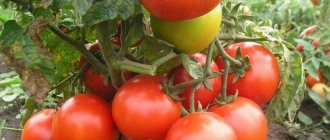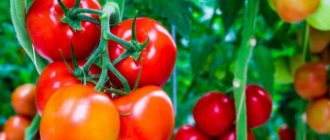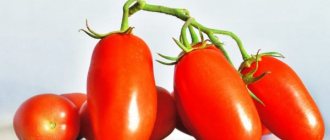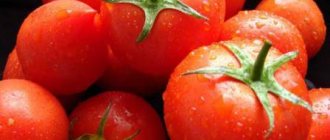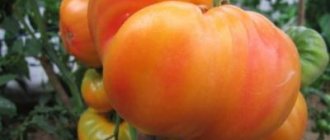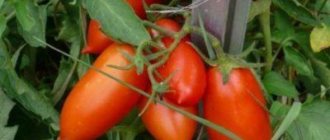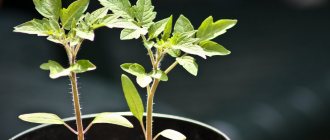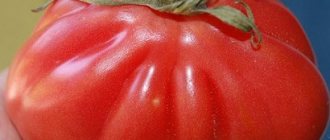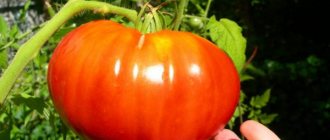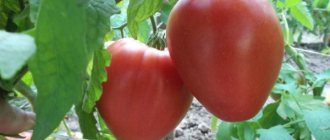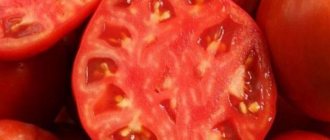A lot is known about tomatoes, but the new Super Exotic product always evokes delight and admiration. The highlight is its unusual appearance and excellent taste. The new product appeared in Ukraine and quickly became famous.
| Height | Landing location | Ripening time | Fruit color | Fruit size | Origin | Fruit shape |
| Tall | Greenhouse, Open ground | Mid-season | Bicolor | Average | Variety | Plum-shaped or oval |
Features of cultivation
According to the State Register, the variety can be grown in open ground or in film shelters.
The colder the climate, the more thoroughly the greenhouse is insulated. The bushes do not need to be pinched, but to speed up ripening, moderate pinching is acceptable. A garter is recommended so that the tomatoes do not lie on the ground.
Mid-early / Low-growing
User rating: 5/5
Mid-season / Low-growing
User rating: 5/5
Early maturing / Low growing
The plant is grown by seedlings. The time for sowing the planting material is determined in such a way that 50 to 55 days pass before the time of planting in a permanent place. Seeds are sown in special containers in previously prepared soil. The following soil composition is considered the most suitable:
- turf 2 parts;
- humus 2 parts;
- fine sand 1 part.
From the moment the seedlings are planted in a permanent place until the first fruits are harvested, 105–110 days pass. Planting material does not need to be deeply buried in the ground. Seedlings are grown at a temperature of 16 C. Picking is done when the shoots form 2 true leaves in a container, the diameter of which does not exceed 10 cm.
It is recommended to adhere to a planting pattern of 40 by 80 cm. The shoots are formed into one stem and the pinching procedure is periodically carried out. The growth point is pinched above the fourth brush of the bush. Care consists of timely watering, removing weeds, loosening the soil to better supply the plant with oxygen and feeding with mineral complexes.
To sow, “Zabava” tomato seeds should first be kept in a pink solution of potassium permanganate for 1-2 hours. After disinfection, they are sown in cassettes or boxes with soil.
Agricultural technology
As practice has shown, the best yield results of the Testi variety are achieved when growing the bush using seedlings. A favorable time for sowing seeds is considered to be mid-to-late March. Transplanting seedlings into closed ground is carried out in mid-May, and into open beds at the end of the month.
Agricultural technology after transplanting seedlings:
- The bush is formed into 1-2 main stems with further pinching of shoots.
- To avoid stem fractures, the plant needs to build a support.
- The variety requires complex feeding with nitrogen and mineral fertilizers.
- To saturate the horses with air, it is recommended to loosen the soil.
The plant does not need regular watering. Irrigation is carried out 1-2 times a week in dry weather.
As you can see, the Testi variety does not require special care. For its development, it is enough to follow the given agricultural technology. But, despite this, everyone who plants a Testi tomato on their plot will be able to get a decent harvest of tasty, sugary fruits that are universally used.
Advantages and disadvantages of the variety
Pros:
- excellent taste;
- good presentation;
- content of nutrients
- good keeping quality;
- resistance to major diseases.
Minuses:
The exotic form of the “Zabava” tomato can be attributed to both the advantages and disadvantages of the variety. The advantage is the unusualness, rarity, and funnyness of this type of tomato, and the disadvantage is the indecent appearance.
| Advantages | Flaws |
| Comprehensive disease resistance | Needs potassium and calcium more than other varieties |
| Good tolerance to temperature changes | When ripe, the fruits fall off the bush |
| Good taste | |
| Transportability | |
| Long-term storage |
Differences between tomato varieties
You cannot give advice based on outside experience, as some do, deliberately introducing not entirely truthful information about the yield (quantity and quality) of grown tomatoes. They say here they are - the best varieties of tomatoes of the past (and, further, in descending numbers) for tomatoes of the year. With everything, however, it should be noted that they often focus on plant varieties proposed for planting for open and closed ground, without understanding that the advice will be good only after personal experience - better after at least 3-4 years (honestly, but extremely rarely , and 2 are sometimes enough) and with meticulous experiments (starting with growing seedlings using the soil additive Vermiculite, the growth stimulator Gumi and, ending with fertilizing: magnesium sulfate, mineral fertilizer Fertika-Kemira and so on - already in the garden) for each variety.
Why am I giving such a deadline? Yes, because you definitely need to take into account the weather, which differs from year to year, and this is the minimum, in my opinion, period to have more or less an idea about each variety of tomatoes.
Productivity
Many gardeners enjoy growing unusual varieties of vegetables and sharing their impressions and experiences with each other. A very rare Superexotic tomato of amateur selection in Ukraine attracted the attention of summer residents with its appearance and taste.
Description:
- mid-season (105–115 days);
- indeterminate bush (1.8–2 m), sparsely leafy;
- carpal ovary (6–20 fruits);
- small tomatoes 40–80 g, rarely up to 120 g;
- the fruits are plum-shaped, dark red or brown with dark green stripes and streaks;
- The pulp is tasty, sweet and sour, marmalade-like.
Every season, the tomato finds more and more new fans and can often be heard about in discussions of successful varieties. Exotic brown tomatoes with dark stripes captivate with their marmalade juicy pulp with an excellent sweet and sour tomato taste.
Seedling
Tomato seedlings are sown 55–65 days before the expected planting in the ground. The indeterminate variety requires planting in large pots of 1.5–2 liters. The soil mixture is prepared from organic components (compost, steamed sawdust, humus, peat) and garden soil from the future garden bed.
To prevent tomatoes from being pulled out, follow the basic rules:
- maintaining the temperature after seed germination within 19-21 ⁰C;
- providing plants with additional lighting with fluorescent spectrum lamps, extending daylight hours by 3–4 hours;
- moderate watering with settled water 20–22 ⁰С;
- feeding seedlings every 14 days with complex mineral fertilizers without excess nitrogen;
- hardening of seedlings, if weather conditions permit (daytime temperature above 16 ⁰C), already from one month of age.
The site for the tomato bed is selected according to the rules of crop rotation. It is prohibited to grow tomatoes in the former place of vegetables from the nightshade family. Tomatoes feel good after root vegetables, cucumbers, and zucchini.
The indeterminate bush Superexotic develops a powerful root system. No more than 3–4 plants can be planted per 1 m2. The bed is prepared to a depth of 40–50 cm, adding compost, humus, and peat to the garden soil in large quantities. Before planting seedlings, water the soil generously with hot water. The beds are mulched with peat or steamed sawdust. This will eliminate the need for frequent loosening of the top layer of soil.
Bush formation
Tomatoes of the Super Exotic variety form a tall indeterminate bush (1.8–2.0 m), which requires obligatory staking to a support. The plant is formed into 2–3 stems, the remaining stepsons are removed. The sparsely leafed bush does not require thinning of the tops. The ovary is formed in large clusters, sometimes up to 20 fruits.
In early to mid-August, the tops of the bushes are pinched and subsequent flowers are torn off, preventing the formation of a new ovary.
These fruits will not have time to ripen before the end of the season and will interfere with the ripening of tomatoes.
Harvest
105–115 days after germination, a mid-season tomato begins to bear fruit. According to reviews from vegetable growers, the Super Exotic tomato is productive, but is demanding on weather conditions. In a good year, each bush can form up to 5-6 large clusters. Fruiting continues until the cold weather. The last unripe tomatoes successfully “arrive” on the windowsill.
Super Exotic tomatoes have good shelf life, at a temperature of 8–10 ⁰C, the fruits can be stored for more than 3–4 weeks. This variety combines external exoticism with excellent taste characteristics. In whole-fruit canning, fancy striped plum-shaped Superexotic tomatoes will successfully decorate the jars of the most demanding housewives.
Seedling
The indeterminate bush Superexotic develops a powerful root system. No more than 3–4 plants can be planted per 1 m2. The bed is prepared to a depth of 40–50 cm, adding compost, humus, and peat to the garden soil in large quantities. Before planting seedlings, water the soil generously with hot water. The beds are mulched with peat or steamed sawdust. This will eliminate the need for frequent loosening of the top layer of soil.
Harvest
xn—-7sbbncec2cn3hzb.xn--p1ai
From 1 sq. m you can remove 7.3 kg of tomatoes.
How to grow seedlings
Preparing seeds for sowing begins 2 months before planting seedlings in the ground. Late February-early March.
Seed preparation
First, the seeds are immersed in a saline solution for 10 minutes. This is how they check the empty ones: those that float up are not suitable for landing.
Disinfect planting material by immersing it in a weak solution of potassium permanganate for 20 minutes. Afterwards, the grains are washed with running water and dried.
Heat treatment for 25 minutes makes the seeds stronger and more elastic, which will help with their germination: the seeds are heated in hot water at a temperature of 52 degrees, having previously wrapped them in gauze. Immediately after this, rinse in cold water for 2 minutes.
During heat treatment, about 30% of seeds may lose their viability. But this is not scary: only non-viable specimens die.
To improve germination, seed material is placed in a growth stimulator for 12 hours. As soon as the seeds swell slightly, they can be sown in the ground.
Container and soil
The soil is prepared from garden soil and humus in equal quantities. For looseness, add a little sawdust or peat - the soil becomes airy and allows moisture to pass through well.
The prepared mixture is laid out halfway in the planting containers, so that later, as the seedlings grow, the remaining soil can be added to the containers. This technique helps to obtain nutrients in the required quantities.
You can plant in a common wooden box and disposable containers, for example, in plastic or peat cups.
Sowing
The seeds are sown in prepared containers to a depth of 1.5-2 cm. Sprinkle peat on top and lightly moisten with a spray bottle. Then the containers are covered with film to create a greenhouse effect.
The sown containers are left in a bright and warm room at a temperature of at least 24 C. If the temperature is maintained at a constant temperature, the first shoots can be seen after 7 days.
Tomato growing technology
Our technology for growing tomatoes of different varieties is as follows. On our plot we allocate 6 long rows for tomatoes (including closed soil). On three of them, representatives of the best varieties of tomatoes, proven over the years, are grown (there are also tomatoes to choose from), guaranteeing a harvest according to the declared characteristics (regardless of the “delights” of the weather), and the other three are planted with new varieties, which are “considered” this way and that in during the above time. That seems to be it.
PS To make life easier for readers and reduce the time it takes to absorb the article, instead of determining the yield of vegetables in kg per 1 square meter, it will be written below - kg “per square”.
PS The results were recorded in an area that: with a good warm season, corresponds to the Central Black Earth region (region), and with a bad warm season, corresponds to the North-Western region. Naturally, this range of latitudes in which the above regions are located definitely includes Siberia, the Moscow region, the Middle Zone, the Urals, the Far East, and then figure out for yourself where exactly the paths lead to your site.
General characteristics of the plant
The Superexotic tomato variety is classified as an indeterminate plant. This means that stem growth does not stop until the end of the summer season. The bushes form new clusters with ovaries until the fall, providing the gardener with a high yield of tasty and healthy vegetables.
Plants show maximum productivity when they are formed into 2-3 trunks. At the same time, the bush does not thicken, and full clusters of fruit are formed on additional stems. In a greenhouse, it is more convenient to grow a bush in one stem, tying it to a trellis cord. In open ground, you can arrange a lattice support for tying up several tomato stems.
The description of the Superexotic variety especially highlights the multi-celled nature of its brushes. Each of them can ripen up to 20 pieces. identical medium-sized tomatoes. The weight of the fruit is about 80 g, but due to the large number of tomatoes and the ability to produce 4-5 bunches per season, the total yield of 1 bush with good care reaches 5 kg or more. From a unit area it is possible to collect 15-20 kg of marketable products.
The advantages of the variety include the relatively early ripening of fruits. When grown in a greenhouse by seedlings, the first ripe tomatoes can be harvested as early as early July. In open ground, tomatoes begin to ripen 100-120 days after emergence.
The best varieties of tomatoes with descriptions
The fruits have a flat-round shape and a pale pink color. The average weight of a ripe fruit is 150 grams. On average, 5-6 fruits ripen on one cluster. The weight and size of a tomato depends on the number of tomatoes ripening on the bush. The fruit has a bright red color and an interesting shape.
Vegetables of this variety are characterized by good keeping quality and are convenient to transport over long distances. This variety is not characterized by cracking. In this case, the tomato will not lose its presentation.
If you store vegetables in a cool place, they can last for a long time. Tomatoes can be used both for fresh consumption and for preservation. The rather large fruit makes it possible to effectively use tomatoes for tomato juice.
For open ground, low-growing varieties that will ripen early are more suitable. Mid-ripening species in good summer weather can produce a fairly good harvest, but they are susceptible to microflora, which can destroy most fruits.
It is customary to grow tall varieties and various hybrids in greenhouses. Here you can plant absolutely any tomatoes, even late-ripening ones.
Reviews
- Valentina, 30 years old: The variety is very, very good - everyone in my family liked it! There was a very large harvest - the tall bushes were completely covered with fruits. We liked it in all forms - we ate it fresh and made salads, delicious. I have prepared several jars for the winter - I hope it will be delicious too.
- Inna, 51 years old: This was the first time I planted such unusual tomatoes, they made me very happy: their yield, their sweet taste. During canning, they do not crack or burst; rolled up in a jar, they look exotic. They were stored for a long time, they are lightweight. They didn’t put much effort into caring - they watered, weeded and treated them for late blight. The variety is excellent, I will plant it again next year.
tomato Subarctic - description and characteristics of the variety
I. Hybrids
Hybrid tomatoes are virtually guaranteed to be resistant to diseases and bad weather conditions, which is something that non-hybrid varieties suffer from. Greenhouses and greenhouses are valued for storing heat, but in them tomatoes can suffer from too high temperatures and sudden temperature changes. In recent years, world selection has been aimed at producing “heat-resistant” hybrids with a reliable guarantee of ovary production.
Hybrids are especially helpful in a greenhouse or a small garden plot where there are no real opportunities for crop rotation and diseases are prevalent. Selection successes demonstrate confident resistance to various types of infections - viral (especially the most dangerous tobacco mosaic virus), fungal, bacterial.
Tomato Incas F1
One of the best hybrids for canning whole fruits without skin. Popular early high-yielding bush hybrid. The plant is medium-sized, compact.
Tomato from the Dutch company Numens, zoned in Russia; entered into the state register in 2000. Mid-early hybrid (105 days) of meter-high vegetables, determinate. Very high resistance to fungal diseases has been recorded. The fruits are 80-100 g, dense, bright red, pepper-shaped, fleshy, uniform, tolerate sunburn well, are very easy to ripen, transported over long distances without loss of quality.
Tomato Torquay F1
Dutch hybrid from Bejo Zaden; in the Russian register since 2007. Mid-season tomato (119-123 days from germination to ripening), bush type - determinant, maximum height of 100 cm. Forms abundant multi-fruit clusters with fruits weighing 60-140 g. Dense tomatoes withstand long transportation, excellent in pickling and pickling matters.
Tomato Bagheera F1
Hybrid from the leading French seed company Cloz. Included in the Russian seed register in 2007.
Early high-yielding hybrids are a real boon for the garden. They are cold-resistant, do not need pinching or tying up, and practically do not get sick. The ripening period is marked as medium-early; determinate bush. The fruit is round, flattened on top, ribbed, weight ranges from 80-220 g. The hybrid is resistant to soil drought and nematode, more suitable for regions located in the south. Does not suffer from fusarium and verticillium wilt.
Tomato F1 Semko 2005
The tomato is suitable for open ground and under film shelters (greenhouses). Determinate, medium-sized, compact. Resistant to soil salinity, drought, high temperatures, grows well in open ground in both southern and northern regions. Vegetables practically do not suffer from viral and fungal diseases, even late blight.
Tomato F1 Semko 2010
Included in the state register in 2010. Ultra-early ripening determinate hybrid - 85-88 days pass from the sprouting of green vegetables to the coloring of fruits. The first brush is formed immediately after the sixth leaf grows. The fruits are incredibly dense for such an early tomato, and are by no means small - 130 g. The shape is round hearts with a beautiful pointed tip.
The newest indeterminate hybrid (on the register since 2015) - tested by us, everything is fine - created taking into account all possible greenhouse disasters. Firstly, it sets well even in the heat, as well as during temperature changes. Secondly, it is tolerant of problematic soil substrates. Thirdly, it shows high resistance to viral, fungal and bacterial infections.
The yield of vegetables varies between 20-30 kg/1 square meter. Mid-early hybrid (100 days from green shoots). The clusters begin to form after 7-9 leaves, each bears 5-6 tomatoes in the shape of rounded hearts, smooth, beautiful, attractive orange color. The weight of the “heart” is 160-190 g. The pulp contains a high percentage of dry matter, sugars, and carotenoids. The fruits are quite dense and do not wrinkle during transportation. Purpose: salad. Created as a foreign-colored version of another hybrid - Tomato Pink Spama.
Bushes of unlimited growth, with dense foliage. Mandatory shaping is required, including a garter. Hybrid of medium early or medium ripening period (112-118 days). Clusters of 6-8 tomatoes weighing 130-150 g. The fruits are plum-shaped, slightly tapering downwards. They are deep red in color, thick-skinned, with a high percentage of dry matter.
Tomato Empire F1
Indeterminate hybrid of a new generation, on the state register since 2011. Mid-early (100 days - 2 days - from germination). The plant is tall, much taller than other types of tomatoes. Therefore, the tomato requires gartering and pinching. Tomatoes are oval-shaped with a spout, weight ranges from 80 to 140 g. On average, 9 kg are obtained per bush. The color of the fruit is red-orange. The skin and pulp are dense. Can be stored for 6-7 weeks. In greenhouses people do not suffer from viral and fungal infections.
On the register since 2015. The bushes are semi-determinate, beautiful, a meter and a half high. Suitable for any soil - open or closed. Plants require pinching. Multiple clusters bear up to 30 fruits with a sweet taste and a perfect “strawberry” shape. The weight is typical for classic cherry tomatoes - 25 g. Thanks to the strong skin, the fruits can be stored for a long time. Early hybrid: ripe fruits appear 91-93 days after the sprouts emerge. The plant is resistant to Fusarium wilt.
Tomato F1 Kaspar
The average ripening period is 115 days. The hybrid is intended for open ground, or is planted under low shelters; We plant three to four vegetable bushes per square.
Tomato Aunt Valya F1
Valya f1 tomatoes are early-ripening, tall hybrids with average yield. The bushes easily and quickly reach a height of 200 cm. In the register since 2015. Productivity within 20 kg per square meter. On average, one bush produces 7 kg of tasty and beautiful tomatoes. Tomatoes ripen simultaneously, reaching 200-250 g in weight.
The fruits have a regular round, slightly oblong shape. The scope of use of tomatoes is very wide. Salads are prepared from the first fruits. As the volume of the harvest increases, the fruits are used for winter harvesting, as well as juices, ketchups, pastes, sauces and lecho. Tomatoes retain commercial quality for a long time and tolerate transportation and long-term storage well.
II. Indeterminate varieties (unlimited growth)
These are tomatoes that will grow until they turn blue until the owner or the onset of the cold season stops them. They have great yield potential, which is more successfully realized in high greenhouses. We place approximately three bushes on 1 square. With supports such as strong trellises, open ground is not prohibited, which will be especially welcome in the southern regions.
Tomato Scarlet candles
Very lightweight. A mid-early Siberian variety for canning whole vegetables. The fruits are elongated, reaching (maximum in our conditions) 13-14 cm in length, weighing about 120 g, and have a beautiful crimson hue. They have few seeds, are very fleshy, strong, and easy to keep. If they are picked green, they do not spoil and ripen perfectly.
The longest
High yield
The variety is productive and unpretentious. Tolerates slight shading. It ties well. Neither high nor low temperatures are scary. It succeeds in protected soil, but outdoor cultivation is not prohibited. Tomatoes begin to ripen in 106-113 days; at the same time, the plant successfully continues to grow and form clusters - up to 10 pieces per bush.
Each bears up to eight graceful fruits - cylindrical and pointed, in full ripeness - iridescent pink in color. The weight of each vegetable is 100-120 g. They contain a high percentage of sugars and dry matter. They do not burst when pickled, are good for drying, obtaining thick juice and, oddly enough in your opinion, for making tomato jam. With diligent care, the bush can bear up to a bucket of quality fruit.
Tomato Niagara
This mid-early vegetable variety has been on the state register since 2010. The bush is tall, but compact in width. It has a highly branched root system, responsive to increased nutrition and good water supply. A valuable feature of this Siberian variety is its multiple clusters, each of which bears up to 14 fruits weighing 85-115 g.
Meaty and sweet
This is one of the sweetest and meatiest products of Siberian breeders. It has been registered in the state register since 2007. The tomato is mid-season (116-118 days from the appearance of sprouts), with large foliage. The fruits resemble long, sharp peppers - they grow up to 15 cm. They are an elegant red color, the weight ranges from 120-185 g. The pulp of vegetables contains very little water and seeds. In the best case, there are up to a dozen fruits in one cluster. One bush gives 2-3 kg.
Tomato Koenigsberg
Excellent ovary
The first ovary is formed after the growth of the 12th leaf, then inflorescences are formed every 3 leaves. Refers to varieties of medium ripening; in Siberian conditions, approximately half of the crop ripens; the rest of the fruits turn red quite well when ripened. Tomatoes in the lower clusters of vegetables weigh 300 g, and in those above - no less than 150 g. The shape is elongated, heart-shaped, smooth, and beautiful.
Vitamin and sweet
Ripe tomatoes have a golden-orange color and contain a record amount of carotene vitamins. The pulp is sweet and aromatic, like berries and fruits. The ripening period is average. The lower fruits are capable of filling up to a mass of 400-450 g, higher up the bush - 200-300 g. They are oval, often with a spout. The plants grow clusters through the leaves, each containing on average, as stated, up to 5 fruits. Productivity is high. The keeping quality is excellent. It is especially tasty when salted with gelatin.
Harvest hearts
Close internodes and a powerful trunk with dense foliage are like standard varieties, only the height is two meters. The Siberian breeding novelty produces half a bucket of fruit from one such “tree”. Ripening begins on the 115th day. Forms up to 6 beautiful clusters with 5-7 red tomatoes weighing 200-250 grams, shaped like strawberries.
Tomato Budenovka
The variety is an improved version of Ox Heart, with a higher yield (about 9.4 kg per square), early ripening, good resistance to diseases (even to late blight) and cracking of the apical tissue of the fruit for a fleshy variety. Heart-shaped, ribbed tomatoes with excellent taste.
Record weight
The variety is a new product from a team of breeding scientists under the leadership of V.F. Gavrisha. Registered in the state register in 2015. Due to the unrealistically large fruits of vegetables, it is included in the “Russian Hero” series. The variety is not very fast in terms of ripening time (from 120 days), therefore it requires early planting of seedlings, especially careful pinching and decent feeding.
Bowl of salad from one fruit
One of the best salad novelties, the yield is high. The plant bears 5-6 racemes. The fruits look very attractive due to their raspberry-pink color, large up to 500-800 g. The tomatoes are flat-round, ribbed, sweet. There is high resistance to cracking; The pulp density is average. A rare quality for large-fruited varieties: the fruits do not tend to quickly soften and spoil during storage.
According to the ripening period, the variety is classified as mid-early and mid-ripe. Perfect for preparing preparations: tomato paste, juice. This tomato variety is characterized by high yield. You can remove up to 5-6 kilograms of tomatoes from one bush.
It has plasticity, rare for a large-fruited variety, and relative unpretentiousness. Delicate sweet pulp combines with excellent keeping quality. The tomatoes are round-flat (their “ribs” stand out a little), sunny orange in color. The average weight of a tomato is 0.5 kg, but in reality there are 1 kg of fruit on the bush.
Planting on the site
Despite all the respect gardeners have for tomatoes, this crop is often grown solely for its benefit, sometimes without noticing its natural beauty and charm. Many people think that tomatoes cannot serve as a source of inspiration. And in vain.
However, if we recall the history of the tomato, it turns out that it came to Europe exclusively as an ornamental plant, because for a long time its fruits were considered poisonous. Today they are the main goal of those who grow tomatoes. Through the efforts of breeders, the image of the classic tomato is being replaced by its younger, more colorful and tasty counterparts, from which an original collection can be assembled.
An experienced tomato grower and tomato collector from Belarus will introduce us to the most amazing of them.
A significant part of my tomato collection consists of varieties with unusual fruit colors. Growing them is a lot of fun. You just want to admire these tomatoes; it’s a pity to pick them, much less use them for food, although they are not only beautiful, but also very tasty.
READ MORE: Tomato Summer Sun: description and characteristics of the variety, yield with photos
Orange strawberry
A tall, mid-season variety from Germany with fruits of wonderful beauty and taste, ideally heart-shaped. The tomatoes are smooth, glossy, with silky skin, and very meaty. Their pulp is oily, with a small number of small seeds. The fruits of Orange strawberries taste sweet, without acid. Fruiting is long, from July to October.
Peaches and cream
The champion in sweetness in my collection is the tall, mid-season American variety Peaches and Cream. Its fruits are flat, orange-yellow, weighing 300-500 g. The pulp is bright orange, very juicy, tender, with a fruity taste and aroma. Tomatoes are just sugary. This is one of my favorite tomatoes.
Grapefruit
Varieties for real gourmets are called bright and elegant bicolors (two-color tomatoes). One of them is an unusual, colorful Grapefruit variety with large yellow fruits, slightly browned with a raspberry color. The pulp is marbled, sweet, juicy. The taste for tomatoes is quite unusual, but very pleasant.
Old timer
Large, even, flat-rounded fruits are produced by the variety from the USA, Starozhil. The tomatoes are orange-yellow with a crimson cap, very fleshy, sweet, tasty, yellow when cut with pink arrows.
Stripe Herman
Amazing color is inherent in tomatoes of the medium-sized German variety Stripe Hermann. They are four-colored: a mixture of yellow, orange, coral and pink; when cut, the flesh is yellow with red streaks. The fruits are juicy, sweet, and the bushes are very productive.
This high-yielding variety is an exotic tomato from California. The juicy large fruits of the Great Striped Boar weigh 300-400 g, have an excellent fresh taste and an original dark brown color with green stripes.
Striped chocolate
Another striped beauty from the USA is Striped Chocolate. A delicious variety with large (up to 700 g) brown fruits, completely covered with green-silver stripes. The pulp is very fleshy and sweet.
The exotic variety Pink Siberian Tiger from the USA will not leave anyone indifferent. You just can’t take your eyes off its fruits! “Tiger cubs” (150-300 g) are distinguished by a purple-pink pearlescent color, anthocyanin shoulders, violet-blue, with purple stripes reminiscent of the color of a tiger. The fruits are tasty, sweet, with a fruity aroma, the flesh is rich red. Tomatoes ripened in bright sun have a more saturated color. The variety is productive and does not require special care.
Ozark sunrise
The bushes of a magnificent, incredibly exotic variety from Germany, Ozark Sunrise, are strewn with an abundance of beautiful fruits weighing up to 250 g. Fully ripe fruits are dark neon pink in color, turning into dark purple stripes towards the top. The taste is excellent, sweet, I got it with a hint of honey. The unusual color is due to the high content of anthocyanins - natural antioxidants that have a beneficial effect on the human body.
READ MORE: Tomato extreme description and characteristics of the variety, yield with photos
Black Brandywine
Black tomatoes also have their own flavor - their color always attracts attention. The king of black tomatoes is called the tall American variety Black Brandywine, whose history began about 100 years ago. Fruits weighing up to 500 g, collected in clusters of 2-5 pieces. The color is purple-brown. The taste is sweet, delicate, the flesh is creamy and juicy. This is one of the earliest black-fruited varieties in my collection, pleasing with a bountiful harvest until October.
Black Crimea
An excellent harvest of large and tasty tomatoes can be obtained by planting the tall variety Black Crimea. Its flat-round, fleshy, brown-red fruits with a green collar can weigh up to 300-400 g. The taste is very rich, “rich”.
Rita black
A very successful tall variety from the USA. The fruits of Rita are black, beautiful dark brown in color, shaped like pears, very sweet and tasty. Bushes always delight with a good harvest.
Tomatoes can be a source of inspiration if you treat them as a beautiful and original crop. And they, in turn, will certainly become a decoration on your table. An experienced tomato grower recommended only proven varieties grown with her own hands. We hope they will not disappoint you either.
If you have any questions or just want to thank the author for the publication, visit Nadezhda Kuts’ page on social networks.
